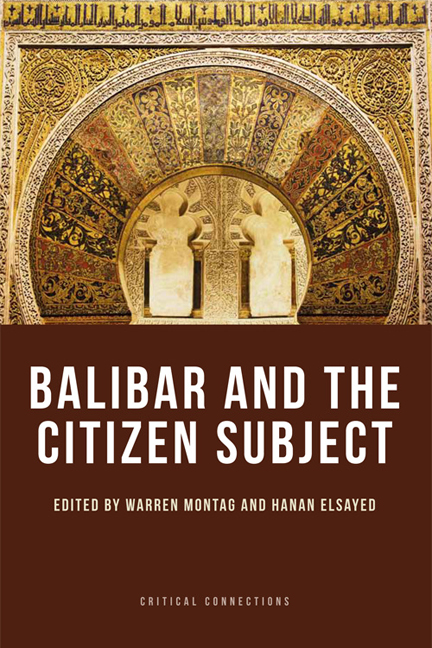Book contents
- Frontmatter
- Contents
- Introduction: Balibar and the Citizen Subject
- Part I Balibar Reading Schmitt Reading Hobbes: Equality or Similitude?
- Part II Transindividual/Universal
- 3 The “Other Scene” of Political Anthropology: Between Transindividuality and Equaliberty
- 4 Intersubjectivity or Transindividuality: The Leibniz– Spinoza Alternative
- 5 A Parallelism of Consciousness and Property: Balibar's Reading of Locke
- 6 Figures of Universalism: Notes on Philosophy and Politics in Etienne Balibar
- 7 Balibar and the Philosophy of Science: The Question of the “Epistemological Break”
- Part III Inequality, Violence and the Possibility of Citizenship
- Notes on Contributors
- Index
5 - A Parallelism of Consciousness and Property: Balibar's Reading of Locke
from Part II - Transindividual/Universal
Published online by Cambridge University Press: 10 January 2018
- Frontmatter
- Contents
- Introduction: Balibar and the Citizen Subject
- Part I Balibar Reading Schmitt Reading Hobbes: Equality or Similitude?
- Part II Transindividual/Universal
- 3 The “Other Scene” of Political Anthropology: Between Transindividuality and Equaliberty
- 4 Intersubjectivity or Transindividuality: The Leibniz– Spinoza Alternative
- 5 A Parallelism of Consciousness and Property: Balibar's Reading of Locke
- 6 Figures of Universalism: Notes on Philosophy and Politics in Etienne Balibar
- 7 Balibar and the Philosophy of Science: The Question of the “Epistemological Break”
- Part III Inequality, Violence and the Possibility of Citizenship
- Notes on Contributors
- Index
Summary
No word more accurately captures the originality of Etienne Balibar's reading of Locke than “parallelism,” a word commonly applied to (but not used by) Spinoza rather than Locke. Balibar's argument that there exists in Locke “a parallelism of responsibility and property, of self-consciousness and ‘property in oneself’” allows us in turn to speak of a kind of parallelism of the two works in which Locke established these concepts, namely An Essay Concerning Human Understanding and the Two Treatises of Government. This is not to say that they form a logical sequence, as if one followed necessarily from the other, but rather that they develop simultaneously in relation to a common object and set of objectives. It is important to keep in mind that “parallelism” as Balibar uses it belongs to a very specific historical and semantic field. First used in its philosophical sense by Leibniz to describe Spinoza's argument in the Ethics that “the order and connection of ideas is the same as the order and connection of things” (Ethics II, P7), the notion of parallelism allowed Hegel to criticize “Spinozism” as a dualism of thought and extension, mind and matter or even form and content rather than the philosophy of immanence that Spinoza thought he had constructed. And while there are many reasons to reject the application of the notion of parallelism to Spinoza, in the case of Locke, it makes visible what we may call the materialist element in his philosophy: the indissociability of his theory of consciousness from his political theory (or perhaps politico-ontology) of property and the disciplinary and punitive strategies that have historically followed from their conjunction. To assert such a parallelism, which is another way of saying that no philosophy is innocent of its practical effects will, Balibar fears, strike many readers as either “paradoxical or intolerable.”
If indeed Balibar's reading is intolerably paradoxical it is certainly because of his insistence that there exists a disavowed solidarity between Locke's speculation on personal identity (at the center of which is consciousness), on the one hand, and on the political (at the center of which is property), on the other, as if the production of Locke's essential concepts takes place in two registers simultaneously: political and philosophical, practical and theoretical.
- Type
- Chapter
- Information
- Balibar and the Citizen Subject , pp. 157 - 181Publisher: Edinburgh University PressPrint publication year: 2017

